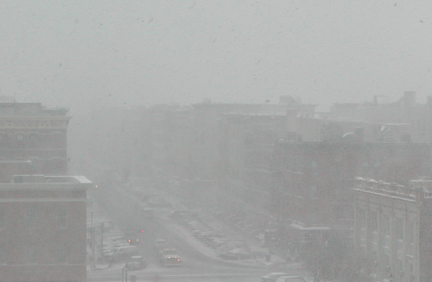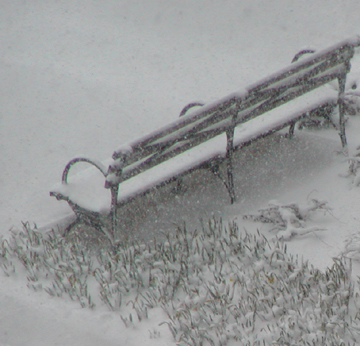Mass destruction, and weapons thereof
(Blogger's note: this post and several others disappeared during our period of technical difficulties. For reference, we have recopied it here, but without the links that were originally included. We hope to restore the links eventually.)
U.S. Defense Secretary Donald Rumsfeld laughed yesterday, literally laughed at the hundreds of reports from journalists on the scene in Baghdad, account after account, image after image of looting, anarchy, and chaos as mobs attack building after building, stripping hotels, shops, offices, even hospitals down to bare walls.
"It's untidy. And freedom's untidy. And free people are free to make mistakes and commit crimes and do bad things," Rumsfeld said, smug as ever. "The images you are seeing on television, you are seeing over and over and over, and it's the same picture, of some person walking out of some building with a vase."
He also insisted that U.S. forces now occupying the city are trying to do something about the looting: "Where they (U.S. forces) see looting, they're stopping it. And they will be doing so."
Not only reporters, not only cameras, not only humanitarian workers, but the occupying troops themselves tell a different story, inadvertently contradicting the Secretary of Defense. The BBC's Paul Wood, a credible journalist if ever there were one, reports: "We have seen the Marines standing by as people carry off armfuls of stolen goods. And the Marines will tell you these are not their orders and that they're here as a fighting force, not a police force."
Wood also answered Rumsfeld's charges that the news media were distorting the story by repeatedly showing the same images of an isolated incident. He said that four BBC reporters went out in four different directions yesterday and all four came back with reports, including video, of looting and chaos. "It's not difficult to find," Wood said, reporting from the media center on the roof of the Palestine Hotel. On the street below him, a small but growing group of Baghdad citizens was staging a peaceful demonstration, with signs in English and Arabic demanding a new government as soon as possible to stop the looting and violence. Most of Baghdad still has no electricity, and therefore no television even though the U.S. military is now broadcasting over the Iraqi airwaves, so it seems unlikely that the demonstrators were there because of distorted images they saw on television.
If Rumsfeld is telling the truth, and the reports we've seen and heard from each and every media organization on the scene not just in Baghdad but in Basra, Najaf, Nasiriyah, Kirkuk, Mosul and elsewhere are not reports but fabrications and distortions, then why is the U.S. military now trying to get police and other officials from the deposed regime to put on uniforms and weapons again and go back to work? If it were just one person carrying the same vase out of the same building over and over, it would seem unnecessary for the liberating forces to be begging the same people who used to round up citizens for torture or execution to help restore order.
U.S. Army Brig. Gen. Vincent Brooks said at yesterday's CENTCOM briefing that "when we entered the city, we found that there were police radios that we'd captured, and the police were calling for (and adjusting?) indirect fire in support of the regime. So putting the police back on is not an easy solution for us."
If the Red Cross and the journalists on the scene are telling the truth, if the buildings we see burning on TV really are burning, if the looters we see gleefully pushing chairs and hospital gurneys down the street loaded with sinks and pipes and refrigerators are really doing what we're seeing them doing, if the hospitals we've seen on TV really have been stripped of everything but the wires that wouldn't come out of the walls, then there really is mass destruction going on in Baghdad.
Mass destruction — as in "weapons of:" the reason the U.S. broke with its own history and invaded another nation unprovoked, as you may recall. The U.S. still insists those weapons are there, somewhere, though the invading forces have had no more luck finding them than the U.N. inspectors before them. If those weapons exist, then what's to prevent the looters from finding them and dragging them home along with the baby incubators and heart monitors they're stealing? Would Iraq, or the world, be a safer place than it was before the invasion and liberation?
The Associated Press reports that yesterday, U.S. Marines found "an enormous cache" of suicide-bomb vests in a Baghdad elementary school, each packed with explosives and ball bearings. There were nearly 50 of them, although it appeared there were a few missing. In a nearby middle school, Marines discovered "hundreds of crates filled with rocket propelled grenade launchers, surface to air missiles, shoulder launched rockets and ammunition," the AP reports. How many other such caches might there be? And how many of them have been discovered by looters rather than the Marines? (By the way, briefing generals: the word "cache" is pronounced like "cash." The word you've been using, "cachet" [pronounced "cash-ay"] is French for stamp, mark, or style.)
The Secretary of Defense says he has "a lot of confidence" that the American people will not believe the reports from journalists and humanitarian workers in Iraq. He did not say whether he had the same confidence about the rest of the world, nor did he respond directly to charges that the U.S. and U.K. are in violation of the Geneva Convention's requirements for occupying forces.
However confident it may be, the U.S. military has also expressed concerns that looters might get their hands on evidence and/or records relating to weapons of mass destruction, and coalition forces are working to keep Iraqi experts on nuclear, biological and chemical weapons from leaving the country. If the records, or the experts, could get loose, then why not the weapons themselves?
I know there are some who sincerely believe that the U.S. invasion of Iraq made the world a safer place. Maybe there are even some who believe Rumsfeld's version of the news. There may still be some who believe that opening all Iraq's cities to looters is the best way to find those weapons of mass destruction and get them out of the hands of those who might use them, and some who believe that asking Saddam's henchmen to go back to policing as usual is the best way to solve Iraq's problems. There are some who believe that the invasion of Iraq will change the mood of the much-talked-about "Arab street," so that the increasing numbers of people who have come to distrust and even hate America and Americans will experience, if they haven't already, a change of heart and come to love us. If you're one of those people, then I hope and pray that you're right, and I'm wrong.
posted by Janet Dagley Dagley @8:53 AM
|
12.4.03  |
This just in
The BBC reports a local militia has taken over at least one Baghdad hospital.
posted by Janet Dagley Dagley @4:07 PM
|
11.4.03  |
This post, headlined "Triage," disappeared during our technical difficulties with Blogger.
posted by Janet Dagley Dagley @1:23 PM
|
 |
Misinformation
Don't believe everything you hear on TV, especially if it's on Fox News, known to many as "Faux news," "faux" being the French word for "fake." (Those who believe that all things French should be expunged are obviously not in agreement with the U.S. military, which flies "sorties," derived from the French verb "sortir," which means "to go out.")
This morning a Fox News anchor smugly declared that the British Broadcasting Corporation did not broadcast the fall of the Saddam statue live. That is absolutely untrue: I know because I was watching the BBC's live stream online, and monitoring not only the BBC via WLIW, channel 21 in New York, but ABC (owned by Disney), NBC (owned by General Electric), CBS (owned by Viacom), Fox, Univision, and Telemundo, among others on TV. I listened to the BBC's hard-working Rageh Omaar, who has been reporting from Baghdad for weeks now, describing the events as they unfolded. WLIW had been showing us long stretches of BBC news in the early days of the war, but by the time the U.S. forces reached Baghdad, they had gone back to their regular programming, giving us only 23 minutes of BBC a couple of times a day. Yesterday, however, WLIW gave us at least 4 hours of BBC, with a running crawl across the screen advising children hoping to see Teletubbies or Big Bird that they should turn to channel 13 (WNET) instead.
Children who hadn't been watching enough educational TV to learn to read yet were out of luck.
I can't stand to watch Fox more than a few minutes at a time for health reasons: if I have it on any longer than that, I start yelling at the TV and my normally normal blood pressure skyrockets. Still, I try to check in on Fox every now and then, just to see how America's most popular news channel is spinning the story.
Although Fox brandishes the Stars and Stripes as if the U.S. flag were its logo, it is not an American network. Fox is owned by Australian mogul Rupert Murdoch, who conquered even more media real estate yesterday by buying DirecTV. The Guardian in London reports that Murdoch is now the most powerful man in television, owning Fox (the network and the stations), BSkyB, SKY PerfecTV, Star, National Geographic, the Speed channel, and now DirecTV. My fellow Oak Ridge, Tennessee, native Charlie Ergen fought long and hard to keep Murdoch from further consolidating his empire, but eventually Murdoch's money won out.
Those are just Murdoch's TV holdings: he also owns the magazines TV Guide, InsideOut, and the Weekly Standard. He owns the New York Post in the U.S., 22 newspapers in Australia, and nine British newspapers. Murdoch also owns the book publisher HarperCollins and other holdings including the Los Angeles Dodgers and Australia's National Rugby League. And when he bought Fox, he also got 20th Century Fox, the movie studio.
DirecTV is part of Hughes Electronics, Hughes as in Howard Hughes, who was a mogul long before Murdoch owned anything. Most recently, Hughes Electronics was owned by General Motors.
Disclosure: I once did business with Murdoch, when he owned a company called News America Syndicate. News America distributed some of my work, and paid me for some of it, usually late and after several threatening letters. I say "some of it" because News America's records of which newspapers in which parts of the world used my work were incomplete, as I discovered when I heard from people who had read my work in their local newspapers, newspapers that weren't mentioned on the statements I got.
To keep this rant balanced and fair, I will also jump on the case of The New York Times, which found it necessary to point out yesterday that the father of former POW Pfc. Jessica Lynch "spoke in the country cadences of his home state, West Virginia." Hey! New York Times! D'youse t'ink da way people toik in N' Yoik is da only propah way to toik? What about those people in Bahstan trying to figure out wheah to pahk theah cahs?
I'm not just one voice in the wilderness in criticizing Fox News: one of the most-linked-to blogs features fictitious interpretations of how Fox might have covered other important events in history. For example, there's a photo of Neil Armstrong about to take his historic small step onto the moon, with the caption, "Geraldo expelled from moon." Then there's the faux Fox report on the crucifixion of Jesus, which claims he died in a "carpentry accident."
The Columbia Journalism Review maintains a list of who owns which media organizations; the "who" part of the list has been getting shorter and shorter as ownership is consolidated into fewer and fewer hands.
posted by Janet Dagley Dagley @8:31 AM
|
10.4.03  |
21 days
Today the pictures are telling the story, pictures we wouldn't have if people weren't willing to risk their lives to keep us informed. While the fall of Baghdad to U.S. forces is cause for celebration, we pause to remember the 11 journalists who lost their lives covering the war, as well as all the others, military and civilian, who died. This war was the deadliest in modern history for journalists, with the press corps death rate 16 times that of coalition forces. There can be no freedom without a free press.
posted by Janet Dagley Dagley @11:55 AM
|
9.4.03  |
No longer reporting live
Today "coalition forces" — the U.S. military, in this case armed with a tank — directly targeted the offices of Reuters News Agency on the 15th floor of the Palestine Hotel in Baghdad, Iraq: a location known to all parties in the conflict as the Baghdad bureau of more than 30 news organizations. Someone among those forces thought there might be a sniper on top of the hotel, although several networks were broadcasting live video not only at the time of the attack, but for at least 30 minutes before, and no sound of any gunshots, shells, or other weapons turned up on any of those networks' recordings, until the Reuters bureau was hit.
It was the third U.S. attack on international journalists in Baghdad in less than 24 hours. Our forces previously attacked the offices of the independent Arab network Al Jazeera, and Abu Dhabi Television.
Tariq Ayoub, a Jordanian citizen working for Al Jazeera, was killed.
Taras Protsyuk, a Ukrainian citizen working for Reuters, was killed.
Jose Couso, a Spanish citizen working for Telecinco, was killed.
Many others working for various news organizations were injured.
The International Federation of Journalists, the European Union, and a growing list of others have strongly condemned the attacks.
Yesterday, two other journalists, Christian Liebig of the German magazine Focus and Julio Anguita Parrado of the Spanish newspaper El Mundo, both embedded with the 2nd Brigade of the U.S. Army's 3rd Infantry Division, were killed by an Iraqi missile along with two U.S. soldiers. Parrado normally worked in the newspaper's New York office, and covered the attacks of Sept. 11, 2001.
On Sunday, Kamaran Abdurazaq Muhamed, a translator working with BBC World Affairs Editor John Simpson in northern Iraq, was killed along with Kurdish freedom fighters and U.S. Special Forces by a U.S. "friendly fire" attack. Simpson continued the live broadcast that was under way at the time, despite a ruptured eardrum and a small piece of shrapnel in his leg.
On April 2, Kaveh Golestan, a freelancer working as a cameraman for the BBC in northern Iraq, died when he stepped on a land mine.
U.S. journalists Michael Kelly and David Bloom both died while covering the invasion of Iraq earlier this month, Kelly in an accident and Bloom from a pulmonary embolism.
The Australian Broadcasting Corporation's Paul Moran and British television reporters Terry Lloyd and Gaby Rado, both covering the war for ITN, were killed March 22.
The Poynter Institute is maintaining an online roster of journalists lost in Iraq.
<<"No story is worth dying for," Major Chris Hughes, United States Marine Corps. >>
Christian Liebig used that quote in one of the last dispatches of his life, as many news organizations are reporting today.
Meanwhile, two non-embedded Polish journalists who were being held captive by Iraqis escaped unharmed and continue their independent reporting.
At midnight Baghdad time, the surviving members of the Baghdad foreign press corps held a candlelight vigil outside the hotel, despite the battle going on around them and the possibility that those tiny flames might draw additional fire, friendly or otherwise.
posted by Janet Dagley Dagley @12:21 PM
|
8.4.03  |
April Showers
Only blizzard-like conditions today; if this had been an actual blizzard, it would have looked like this instead of this:


Another difference: this time there are flowers in the snow:

posted by Janet Dagley Dagley @2:39 PM
|
7.4.03  |
The Candy Bomber, and other 'friendly fire'
The Candy Bomber wants to fly again, this time over Baghdad. The Associated Press reports today that Retired Air Force Col. Gail Halvorsen, 82, who previously dropped an estimated 23 tons of candy over Berlin and unknown (but much smaller) quantities over Bosnia and Kosovo, plus numerous demonstration drops over U.S. elementary schools, is eager to make another run. Halvorsen spoke at a symposium in Dayton, Ohio, on the 100th anniversary of human flight. If Halvorsen does fly over Baghdad, we hope the candy he drops will be any color other than yellow, because the yellow humanitarian daily rations the U.S. has been dropping look almost exactly like the yellow bombs we've been dropping in the same places. Brig. Gen. Vincent Brooks, CENTCOM deputy director of operations, addressed the subject the other day at the daily droning briefing in Doha, Qatar:
<<The humanitarian daily rations have changed color. We learned some lessons from Afghanistan, and the color of the package is different now. Previously they were bright yellow. There still are some that are out there in the possession of units that are trying to provide humanitarian assistance as they make contact. But the great majority of them in stockages that are being pushed forward in bulk are a different color to account for that. So we're sensitive to the concern about it, and we believe we're taking the right approach to that potential issue and problem. Third row, please.>>
Meanwhile, a new book, The Hunt for Bin Laden by Robin Moore, points out another problem with the ration packets: the little moisture-absorbing packets inside them. Although the packets-within-the-packets are clearly labeled "do not eat," that's only helpful to those who can read it. Some Afghan children didn't follow the instructions and got very, very sick.
'Shut up! I'm broadcasting ... What? I'm bleeding?'
The BBC's World Affairs Editor John Simpson was slightly injured today in a "friendly fire" incident when U.S. forces bombed a Kurdish convoy that also included Simpson, U.S. Special Forces, and the brother of a Kurdish political leader. Simpson, who continued his live broadcast despite a shrapnel wound to his leg, said he counted at least 10 bodies. "This is just a scene from hell here," Simpson said.
At least Simpson survived. Two journalists embedded with the U.S. Army's 3rd Infantry Division have died in Iraq in the past few days, neither in combat: Michael Kelly of the Washington Post and Atlantic Monthly died in a Humvee accident, and NBC correspondent David Bloom died of a pulmonary embolism at the age of 39.
To keep track of the surviving journalists covering the invasion of Iraq, the Poynter Institute offers a handy (and colorful) map featuring the locations of more than 400 reporters, not including Geraldo Rivera. And to keep track of those who have made the ultimate sacrifice on the job, the Committee to Protect Journalists keeps lists of journalists killed in action and missing in action.
Baghdad civilian correspondent Salam Pax hasn't posted any new dispatches on his blog since March 24, but while we wait to hear from him, and pray that he and his family are safe despite all the "friendly fire" in his city, some fans have set up a blog about him, called "Where is Salam?".
No official word yet on whether it was "friendly fire" that hit a convoy of Russian diplomats fleeing Baghdad this morning. The U.S. military, which was informed about the Russians' travel plans in advance, is investigating the incident. Coincidentally, U.S. National Security Advisor Condoleeza Rice was already on her way to Moscow to try to keep U.S.-Russian relations from deteriorating further.
posted by Janet Dagley Dagley @9:34 AM
|
6.4.03  |
|




